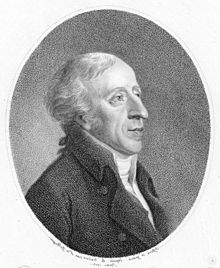Vincenzo Righini
Vincenzo Righini (born January 22, 1756 in Bologna , † August 19, 1812 there ) was an Italian composer and opera singer (tenor).
Life
Vincenzo Righini received his education at the Accademia Filarmonica in Bologna, with Padre Martini . The first appearances are documented around 1769 in Florence and 1770 in Rome. Then he was employed as a tenor in the Prague Opera Company of Giuseppe Bustelli , for which he also composed operas. From 1777 to 1788 he worked as a singing teacher and composer in Vienna. During Antonio Salieri's stay abroad , Righini was deputy court conductor for several months in 1787. His Viennese students included Josepha Weber and Maria Theresia von Paradis , among others .
In 1788 Righini entered the service of the Elector of Mainz Friedrich Karl Joseph von Erthal as court conductor . Since Righini was called to Berlin as the Prussian court conductor in 1793, Righini's position in Mainz was taken over by Franz Xaver Sterkel . In Berlin he met the opera singer Henriette Kneisel and married her in 1794. The marriage was divorced in 1800. During his time in Mainz, too, Righini advanced to become a singing teacher of considerable renown, including for Bettina von Arnim and possibly Princess Elisabeth of Württemberg .
Among his compositions, in which the German element has already come to the fore alongside the Italian element, the Missa solemnis in D minor for the coronation of Emperor Leopold II (Frankfurt, 1790) and a Te Deum in 1809 to celebrate the return of the royal couple should be emphasized from Königsberg . Righini was director of the Italian court opera from 1793, first with Johann Friedrich Reichardt and from 1795 with Friedrich Heinrich Himmel .
When from 1797 Friedrich Wilhelm III. reduced court music, Righini was released from numerous tasks and began concert tours that took him to Hamburg, Ludwigslust and Italy.
Righini wrote more than 20 stage works, including: Armida , Atalanta e Meleagro , Enea nel Lazio , Tigrana and Gerusalemme Liberata . He also composed church music, secular cantatas, some instrumental works and numerous vocal compositions, including over 150 mostly German songs , which, like his operas, were soon forgotten after his death.
In 1790/91 Beethoven wrote his Twenty-Four Variations on the ariette “Venni Amore” by Vincenzo Righini for piano (D major) WoO 65.
Righini died in 1812 after a long illness on a vacation trip to his native city of Bologna.
Works
- Il convitato di pietra o sia Il dissoluto , opera, premiered Vienna 1777
- La vedova scaltra , Opera, UA Vienna 1778
- Armida , Opera, premiered in Vienna 1782
- L'incontro inaspettato ossia Lo sposo confuso , Opera, Premiere Vienna 1785
- Il demogorgone ovvero Il filosofo confuso , Opera, Premiere Vienna 1786
- Coronation Mass , Frankfurt 1790
- Alcide al bivio , Opera, Premiere Koblenz 1790
- Enea nel Lazio , Opera, premiered in Berlin 1793
- Il trionfo di Arianna , Opera, Premiere Berlin 1793
- Atalanta e Meleagro , Opera, Premiere Berlin 1797
- Tigrane , Opera, Premiere Berlin 1800
- La selva incantata / Gerusalemme Liberata ossia Armida al campo de 'Franchi , opera (in two parts), premiered in Berlin 1803
- Te Deum laudeamus , Berlin 1809
literature
- Constantin von Wurzbach : Righini, Vincenz . In: Biographisches Lexikon des Kaiserthums Oesterreich . 9th part. Kaiserlich-Königliche Hof- und Staatsdruckerei, Vienna 1863, pp. 151–153 ( digitized version ).
- Ernst Friedlaender: Righini, Vincenzo . In: Allgemeine Deutsche Biographie (ADB). Volume 28, Duncker & Humblot, Leipzig 1889, p. 608 f.
- Konrad-Jürgen Kleinicke: The church music creation of Vincenzo Righini. Contributions to the composer's biography . Schneider, Tutzing 1984. ISBN 3-7952-0443-7
- Christoph Henzel: The Italian court opera in Berlin around 1800: Vincenzo Righini as the Prussian court conductor. Stuttgart 1994. ISBN 3-476-01263-8
Web links
- Short biography (German) (PDF file; 69 kB)
- Sheet music and audio files by Vincenzo Righini in the International Music Score Library Project
- List of the stage works by Vincenzo Righini based on the MGG at Operone
- Vincenzo Righini at Operissimo on the basis of the Great Singer Lexicon
Individual evidence
- ↑ a b c d Dr. Gustav Schilling: Righini, Vincenzo . In: Encyclopedia of the Entire Musical Sciences or Universal Lexicon of Tonkunst , Volume 6. FH Köhler, Stuttgart 1838, pp. 4-6. ( Online )
| personal data | |
|---|---|
| SURNAME | Righini, Vincenzo |
| BRIEF DESCRIPTION | Italian composer and opera singer (tenor) |
| DATE OF BIRTH | January 22, 1756 |
| PLACE OF BIRTH | Bologna |
| DATE OF DEATH | August 19, 1812 |
| Place of death | Bologna |

